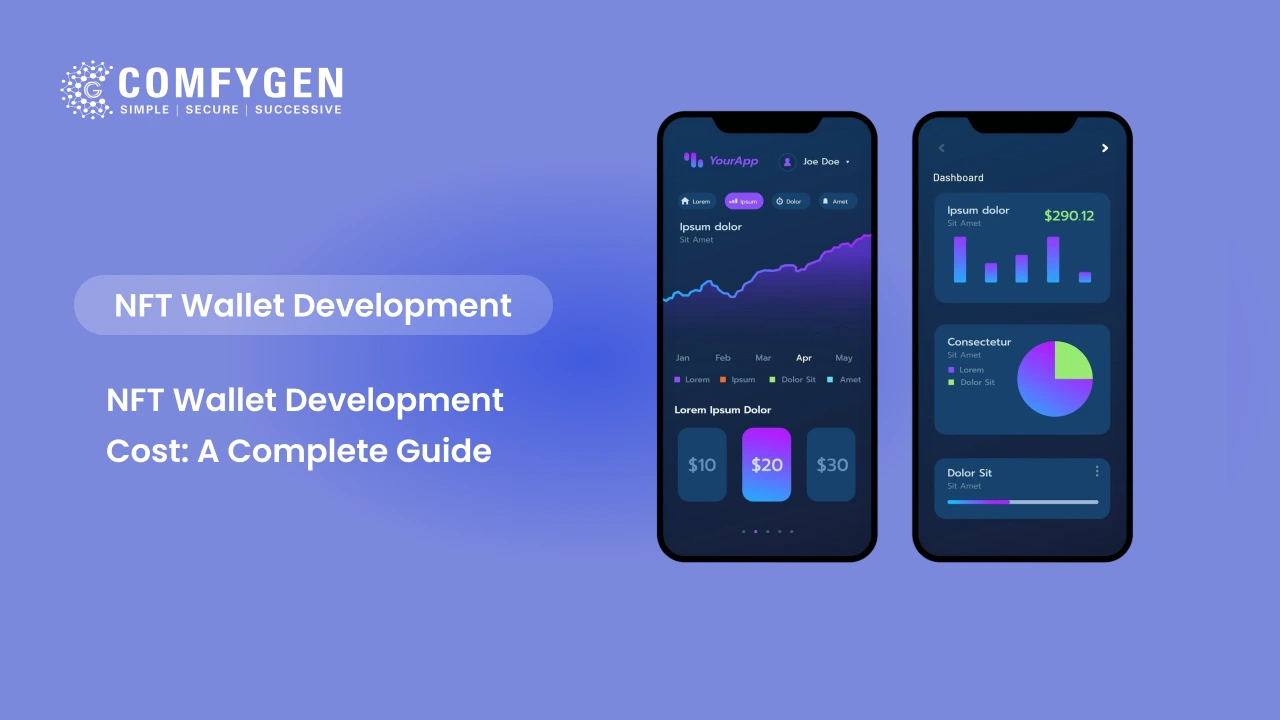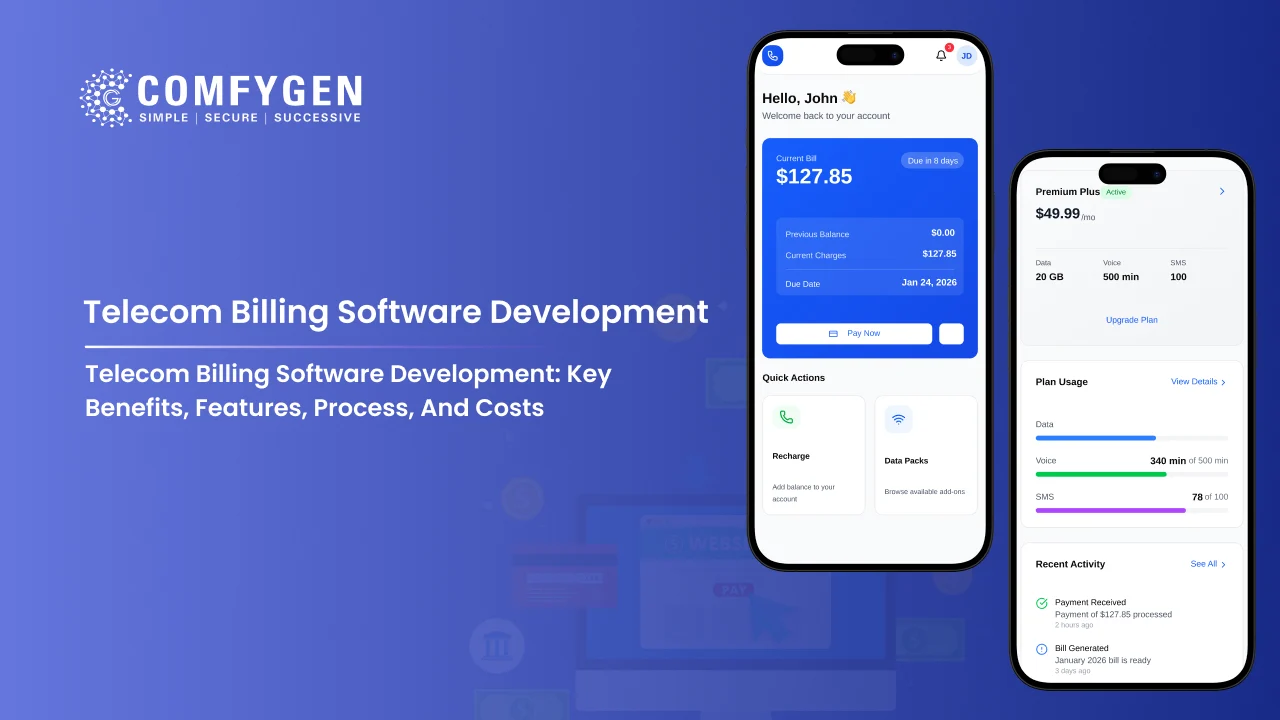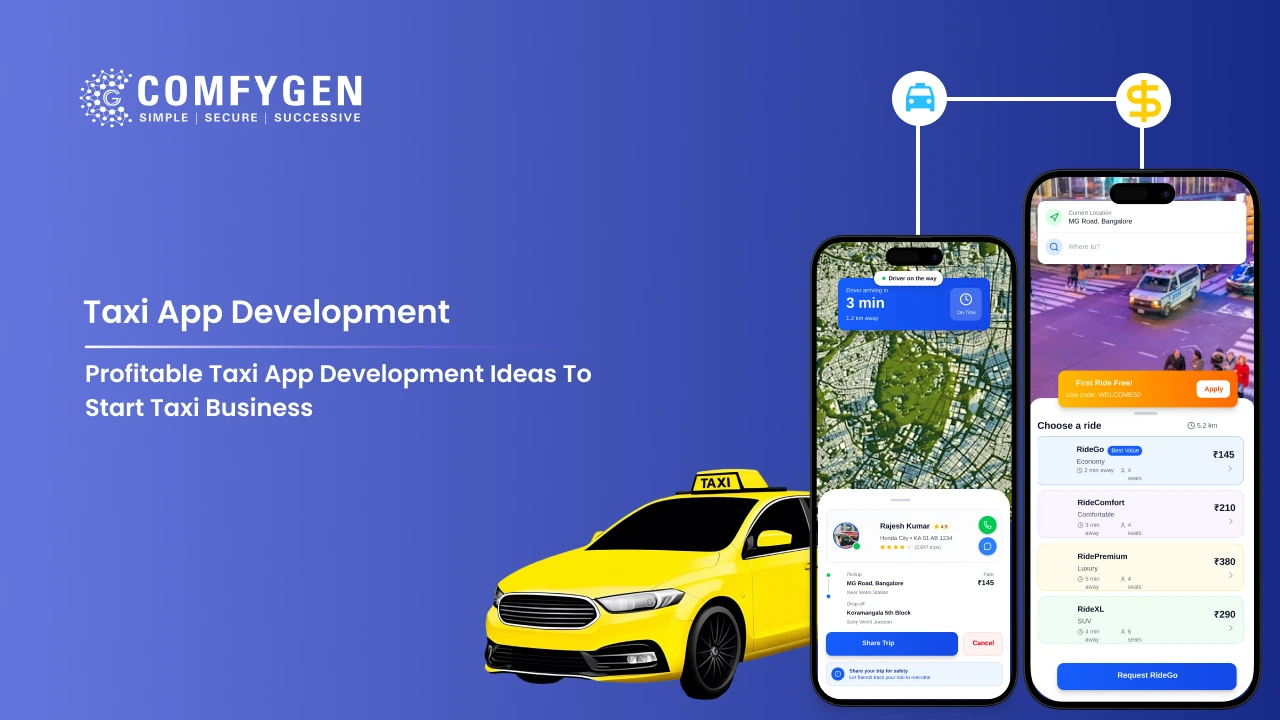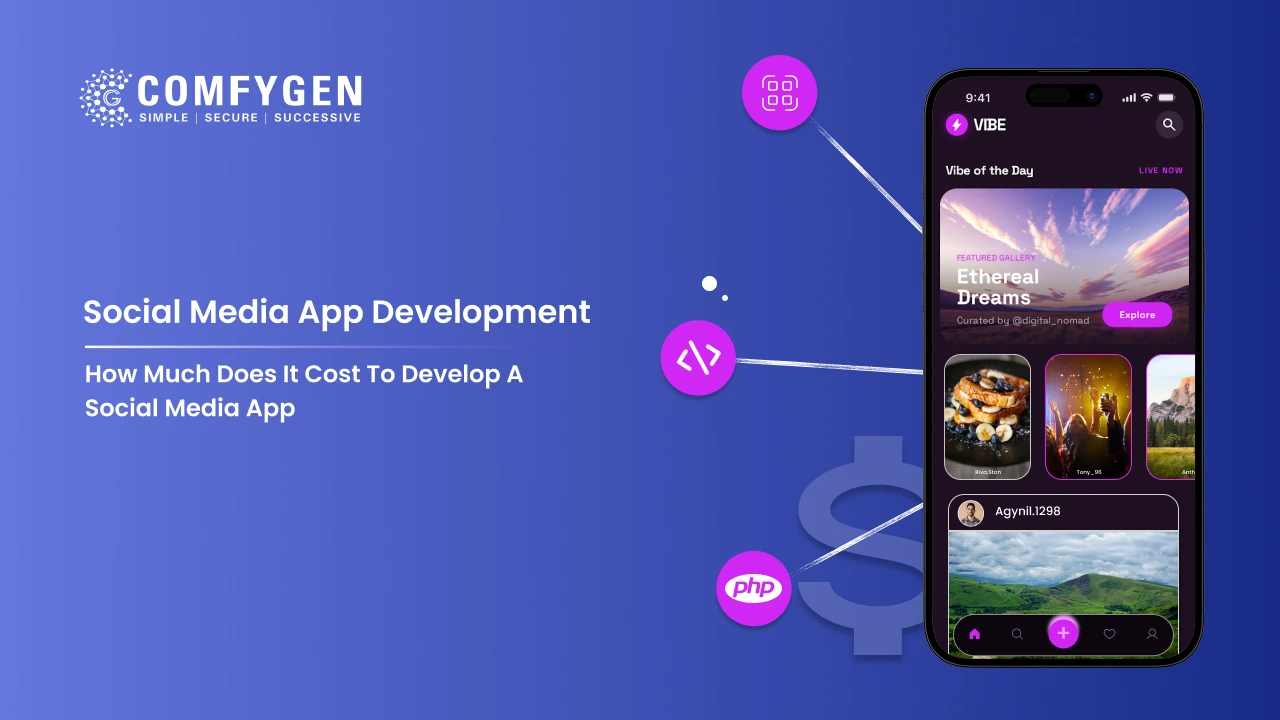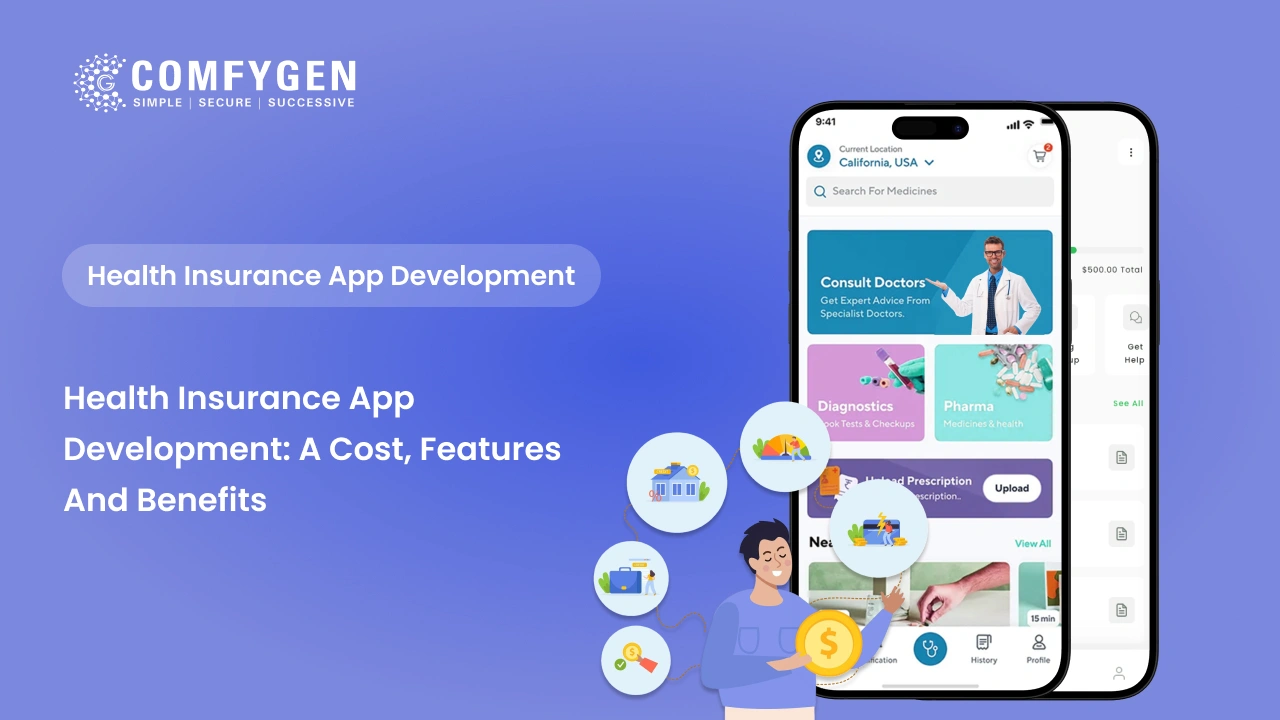NFT Wallet Development Cost: A Complete Guide
NFTs have moved from a Specific trend to a mainstream digital asset. Artists, gamers, brands, and real estate companies are using NFT wallets to create value and engage audiences. For many businesses, understanding the NFT wallet development cost is essential for securely storing, trading, and showcasing digital assets.
NFT wallet development isn’t only about writing code. It requires the right blockchain platform, integrating key wallet features, implementing high security, and designing a seamless user experience. Each decision directly impacts the cost of NFT wallet development.
This Blog elaborates on pricing factors, hidden costs, and strategies to optimize your investment, giving you a clear picture of what it takes to successfully execute NFT wallet development.
What Is an NFT Wallet?
An NFT wallet is a digital wallet application that allows users to store, send, receive, and manage their non-fungible tokens. Think of it as the home for your NFTs—whether that’s digital art, in-game assets, music, or real estate tokens. Same as a traditional wallet holds cash and cards, and know NFT wallet holds the private keys that prove ownership of your digital assets. Without it, you can’t really interact with the NFT system.
Key features of an NFT wallet include:
- Storage – Safely keeping NFTs and the private keys linked to them.
- Trading – Buying, selling, or transferring NFTs directly within the wallet or through NFT marketplace integrations.
- Minting – Some wallets allow creators to mint new NFTs, making it possible to launch collections without switching platforms.
- Multi-chain support – Many wallets now support Ethereum, Solana, Polygon, and other blockchains to give users flexibility.
- Security measures – Encryption, two-factor authentication, and sometimes biometric logins to keep assets safe.
NFT wallet development isn’t just coding—it’s about integrating these features, selecting the right blockchain platform, implementing high-level security, and designing a smooth user experience. Each choice directly influences the NFT wallet development cost.
Why Businesses and Startups Need NFT Wallets
NFT wallets are now not only used by digital art collectors. They cover wind areas across gaming, sports, music, real estate, fashion, and even enterprise supply chains as well. As adoption grows, businesses are realizing that an NFT wallet isn’t just a tool; it’s a gateway to generating new revenue models and customer engagement.
For startups, an NFT wallet is the backbone of their product ecosystem. Whether it’s a gaming app with in-game NFT assets or a marketplace for digital collectibles, owning the NFT wallet means owning the user relationship. Instead of sending customers to a third-party wallet, a startup can offer a branded, integrated experience that keeps users engaged and loyal.
Enterprises see another angle: control and scalability. A custom NFT wallet allows them to integrate NFTs into loyalty programs, ticketing systems, or digital identity solutions. It also gives them the flexibility to scale features as the business grows—something that’s harder to do when relying on external wallets.
Benefits of building a custom NFT wallet instead of using third-party platforms include:
- Full control over design, branding, and user experience
- The ability to integrate directly with business workflows and marketplaces
- Stronger data ownership and insights into user behavior
- Freedom to add custom features like multi-chain support, cross-border payments, or in-app NFT minting
- Long-term cost savings by avoiding dependency on third-party transaction fees and limitations
Factors That Affect the NFT Wallet Development Cost
NFT wallet development cost isn’t fixed. It depends on the technical tools you use, the design you select, and the expertise of the NFT wallet Development team you hire. Let’s break down the main factors that shape the budget.
- Features and functionalities
The more features you want, the higher the NFT wallet development cost. A basic wallet might only handle storage and transfers. A more advanced one could include multi-chain support, marketplace integration, portfolio visualization, in-app NFT minting, push notifications, and social sharing. Each feature adds development hours and complexity. - Blockchain platform
Not all blockchains are equal in terms of development effort. Ethereum-based NFT wallet development cost more because of its popularity and demand for skilled wallet developers. Solana, Polygon, and Binance Smart Chain can sometimes be faster and cheaper to integrate, but may require specific expertise. If you plan to support multiple blockchains, NFT costs rise accordingly. - Technology stack
The tech stack covers the front end (user interface), back end (server-side logic), and smart contracts. The choice of programming languages, frameworks, and APIs directly affects NFT wallet development time. For example, wallets with React Native front ends and Solidity smart contracts may cost differently compared to those built with Flutter and Rust. - Type of wallet
Are you building a mobile app (iOS/Android), a web-based wallet, a desktop app, or a cross-platform solution? Mobile wallets generally take longer because of separate development and testing for each operating system. Cross-platform wallets reduce costs but may compromise performance if not built carefully. - Design complexity and user experience
A clean, user-friendly interface takes time to design and refine. Simple designs cost less, while advanced interfaces with animations, dashboards, and customizable themes require more design hours and testing. It directly affects the NFT wallet development cost. Since user experience is critical in finance and crypto apps, this is one area where cutting corners can hurt in the long run. - Security measures
High security is non-negotiable. Features like end-to-end encryption, multi-factor authentication, biometric login, hardware wallet integration, and anti-phishing protections add both time and cost. Security audits by third parties are another expense you’ll want to plan for. - Development team location and expertise
Where your developers are based has a big impact on NFT wallet development cost. Hiring a team in North America or Western Europe typically costs more than working with experienced developers in Asia or Eastern Europe. Beyond location, expertise matters—specialized blockchain developers charge premium rates compared to general app developers. You can hire an NFT wallet development team from Comfygen, combining deep blockchain development expertise with competitive pricing.
Average NFT Wallet Development Cost
Now that we’ve covered the factors, let’s put some numbers on the table. The cost to build an NFT wallet varies widely depending on region, feature set, and complexity, but here are realistic ballpark figures.
NFT Wallet Development Cost by Region
| Region | Estimated Annual Cost for NFT Wallet Developers |
| United States & Canada | $80,000 – $150,000+ (higher developer rates and compliance costs) |
| Western Europe (UK, Germany, France, etc.) | $70,000 – $120,000 |
| Eastern Europe (Poland, Ukraine, etc.) | $40,000 – $80,000 |
| Asia (Singapore, Vietnam, Philippines) | $30,000 – $60,000 |
| India | $25,000 – $50,000 (competitive rates with strong blockchain expertise) |
NFT Wallet Development Cost by Complexity
- Basic NFT Wallet – $25,000 to $40,000
- Core features like storage, transfers, and basic security
- Medium Complexity Wallet – $40,000 to $70,000
- Added features like marketplace integration, multi-chain support, and portfolio visualization
- Advanced Wallet – $70,000 to $150,000+
- Cross-platform apps with custom design, in-app NFT minting, hardware wallet support, and enterprise-grade security
NFT Wallet Development Timelines
- Basic wallet – 2 to 3 months
- Medium wallet – 3 to 6 months
- Advanced wallet – 6 to 9+ months (depending on security audits, blockchain integrations, and custom features)
Secure, Trade, and Manage Your NFTs Effortlessly
Build Your Custom NFT Wallet with Us Today!
Let’s Connect
Hidden NFT wallet Development Cost
When planning your NFT wallet development budget, it’s easy to focus only on the upfront development cost. Here the several hidden costs can quietly add up if you don’t account for them.
- Maintenance and Updates
A NFT wallet isn’t a “set it and forget it” product. Blockchain networks evolve, operating systems update, and user expectations shift. Regular maintenance ensures your NFT wallet stays compatible, secure, and bug-free. Neglecting this can lead to downtime, user complaints, or even lost assets. - Security Audits
NFT wallets handle valuable digital assets. Even a small vulnerability can lead to hacks or theft. Independent security audits are essential to ensure smart contracts, APIs, and encryption are airtight. Audits aren’t cheap—they can cost 10–20% of your original development budget—but they’re critical for trust and liability protection. - Scalability and Feature Upgrades
As your user base grows, your NFT wallet may need additional features or performance improvements. Multi-chain support, faster transaction processing, or integration with new NFT marketplaces often require extra development work. Planning for scalability early helps avoid costly redesigns later. - Compliance and Regulatory Costs
Depending on your region and the type of NFTs handled, there may be legal or regulatory requirements to meet. This could include KYC/AML processes, data privacy measures, or digital asset licensing. Compliance costs vary widely but can significantly impact your total budget if not factored in from the start.
How to Reduce the NFT Wallet Development Cost
NFT wallet Development Cost may be high, but by smart ways to manage costs without compromising quality or security.
- Choosing the Right Blockchain
Not all blockchains are created equal. Some, like Ethereum, come with higher wallet development and transaction costs, while others, like Polygon or Solana, can be more cost-effective. Picking a blockchain technology that aligns with your NFT wallet’s goals and target users can save both time and money. - Using White-Label Solutions
White-label NFT wallets are pre-built solutions that can be customized with your branding and features. They’re significantly cheaper than building from scratch and allow you to launch faster, especially if you’re testing the market or building an MVP. - Prioritizing MVP Before Full-Scale Launch
Start with a minimum viable product that includes only core features like storage, transfers, and basic security. Launching an MVP helps you validate your concept, get user feedback, and gradually add advanced features. This staged approach reduces upfront costs and minimizes the risk of investing in features users may not need. - Partnering with Experienced NFT Wallet Development Companies
Hiring Comfygen’s NFT wallet development team can be more cost-effective in the long run. Their specialists in blockchain and NFT wallets follow best practices, avoid common pitfalls, and speed up development—saving both time and money compared to a generalist team learning as they go.
Real-World Use Cases of NFT Wallets
NFT wallets are not only theoretical tools, they’re being actively used in every industry to unlock new ways of creating, trading, and managing digital assets. Here’s where they make a real impact:
- Gaming and Metaverse
In-game assets like skins, weapons, and virtual real estate are increasingly tokenized as NFTs. NFT game wallets allow players to securely store and trade these assets, participate in virtual economies, and move assets across game development or metaverse development platforms. For developers, integrated wallets create a seamless user experience that keeps players engaged. - Art and Collectibles
Digital art marketplaces depend on NFT wallets to store ownership certificates and facilitate secure transactions. Artists and collectors can sell and showcase digital artwork directly from the NFT wallets. Custom NFT wallets can even include features like royalty tracking, ensuring artists earn from every resale. - Music and Entertainment
NFTs are transforming the way musicians, filmmakers, and creators monetize content. NFT wallets allow fans to buy exclusive tracks, limited edition albums, or concert tickets as NFTs. Artists benefit from direct-to-fan sales, while fans gain verifiable ownership of unique digital content. - Real Estate and Tokenized Assets
NFTs are increasingly being used to represent ownership in real-world assets such as property or investment stakes. NFT wallets allow users to store these tokens securely, transfer ownership, and track investment portfolios. This makes transactions more transparent and opens up new opportunities for fractional ownership.
Final Thoughts
Developing an NFT wallet is more than just a technical project; it is an investment in security, user experience, and your business’s digital future. The NFT wallet development cost can vary widely depending on features, blockchain platforms, security measures, and the expertise of the development team. Hidden expenses like maintenance, audits, and compliance can also increase costs, so careful planning is essential.
At Comfygen, our NFT wallet development team delivers secure, intuitive, and cost-effective solutions. We develop NFT wallet development services to your needs, ensuring that your NFT wallet development cost is optimized without compromising quality, whether you’re a startup or an enterprise seeking a full-featured wallet.
Summary
Here’s a short summary of the blog “NFT Wallet Development Cost: A Complete Guide” from Comfygen:
The blog explains everything about NFT wallet development, including:
- Introduction: Importance of NFT wallets in the digital asset ecosystem.
- Types of NFT Wallets: Web, mobile, and desktop wallets with their features.
- Key Features: Security, multi-currency support, cross-platform compatibility, and user-friendly interface.
- Development Process: Steps like research, choosing the right blockchain, UI/UX design, smart contract integration, and testing.
- Cost Factors: Technology stack, complexity, customization, security features, and developer expertise.
- Estimated Cost: The cost varies based on features, but generally ranges from a basic wallet to an advanced, feature-rich solution.
- Conclusion: Businesses should invest in NFT wallet development to ensure security, scalability, and a better user experience.
In short, the blog guides readers on how much it costs, what features to include, and why NFT wallets are essential for the growing NFT market.

Mr. Saddam Husen, (CTO)
Mr. Saddam Husen, CTO at Comfygen, is a renowned Blockchain expert and IT consultant with extensive experience in blockchain development, crypto wallets, DeFi, ICOs, and smart contracts. Passionate about digital transformation, he helps businesses harness blockchain technology’s potential, driving innovation and enhancing IT infrastructure for global success.

